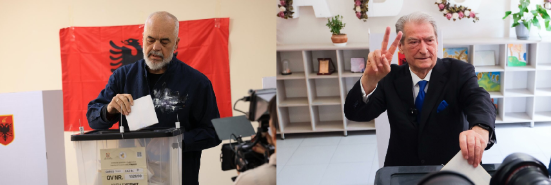As Albania heads to the polls, the race between Edi Rama and Sali Berisha transcends a typical electoral contest—it is emblematic of a deeper struggle between entrenched political legacies and a society increasingly fatigued by decades of recycled leadership.
Rama, seeking a fourth consecutive term, presents himself as the guarantor of stability and European integration. His campaign has leaned heavily on Albania’s recent economic growth and diplomatic strides, particularly in aligning with EU standards.
Yet, his expanding grip on state institutions and a string of corruption scandals—most notably the arrest of Tirana mayor Erion Veliaj—have drawn criticism for consolidating power in ways reminiscent of the very systems Albania has promised to outgrow.
Berisha, by contrast, offers himself as a vessel for change, yet his return is itself a
paradox. Once labelled Albania’s “father of democracy,” Berisha’s current candidacy is overshadowed by U.S. sanctions and an active criminal investigation. His calls for voters to support jobs, pensions, and “a second summer day” evoke nostalgia more than reform, especially among a younger generation disillusioned by both his and Rama’s prolonged political dominance.
Sunday’s election reflects not just a contest of policies, but a clash of legacies. Both Rama and Berisha symbolize the post-1990 era that, while delivering democratic institutions, has also been marked by corruption, elite impunity, and political stagnation. The absence of strong new leadership alternatives in these elections is telling: many voters, particularly the youth, are either disengaging or contemplating emigration rather than casting a ballot.
The inclusion of the diaspora for the first time adds an unprecedented layer of participation—but whether it brings genuine change or merely amplifies existing power structures remains to be seen. And with polls suggesting Rama’s Socialists may require smaller parties to maintain their thin majority, coalition bargaining could again shape the next government.
Ultimately, Albania’s 2025 elections pose a critical question: can the country modernize its political culture while still being steered by the figures who have dominated it for over three decades? For now, both hope and scepticism remain tightly bound to the familiar faces that have long shaped the nation`s fragile democratic path.
Written by our correspondent A.T.



